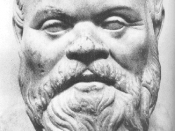A Look into the Platonic soul
In Plato's Republic, Socrates explains his idea of the moral soul being an ideal soul. Socrates' proved this by comparing an ideal soul to an ideal society. This analogy allowed Socrates to develop a theory for the composition of the soul. This theory proposes that the mind is divided into 3 parts; the rational part, the passionate part and the appetites. In his ideal soul the rational part is in charge, much like a leader is of a country, responsible for the well-being of the other parts of the soul. The passionate part in the ideal mind is an ally to the rational part, coming to the aid of the rational mind when anything threatens its beliefs. The last part of the soul is the appetites. This part of the soul is described as the wants and needs of the body. Despite the fact Socrates believes that these things should not govern the ideal soul, he did acknowledges they serve vital purposes such indicating when one was hungry.
To complete Socrates definition of the moral/ideal soul, he proposed that there were four attributes within it, all shown in exterior behaviours, these attributes are known as wisdom courage, self-discipline and morality.
The attribute of wisdom is in part due to the rational part of the mind. Socrates figured that that is where one was most likely to find it. This is a reasonable claim, as we do not call someone wise if they can make a fine pair of shoes, a wise person in society is considered wise if their decisions are wise. In Socrates' ideal soul, the rational part is responsible for ruling over the rest of the soul and for cultivating this type of wisdom, moral knowledge. This wisdom generated...


